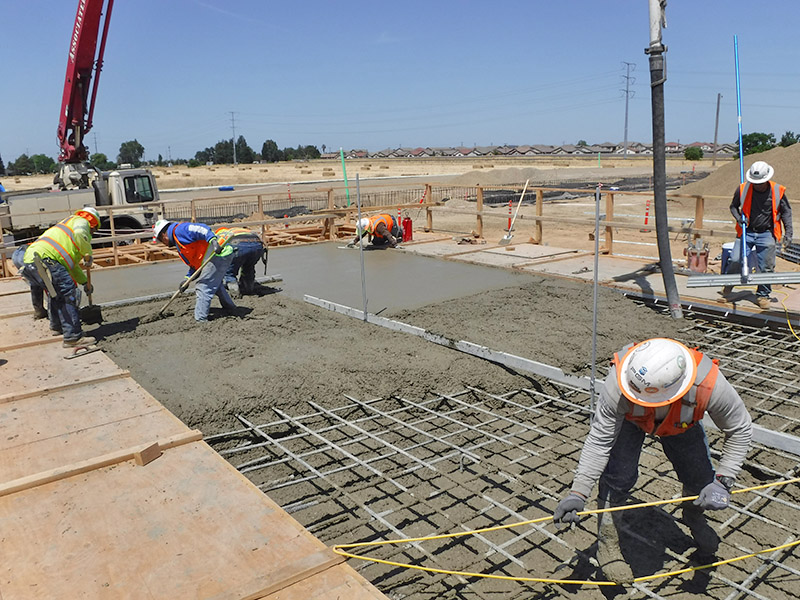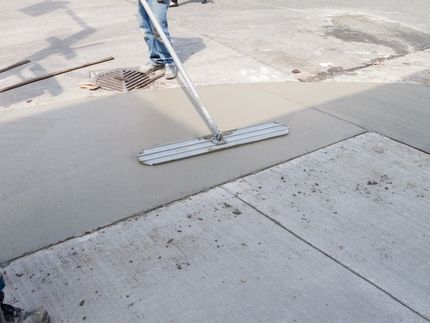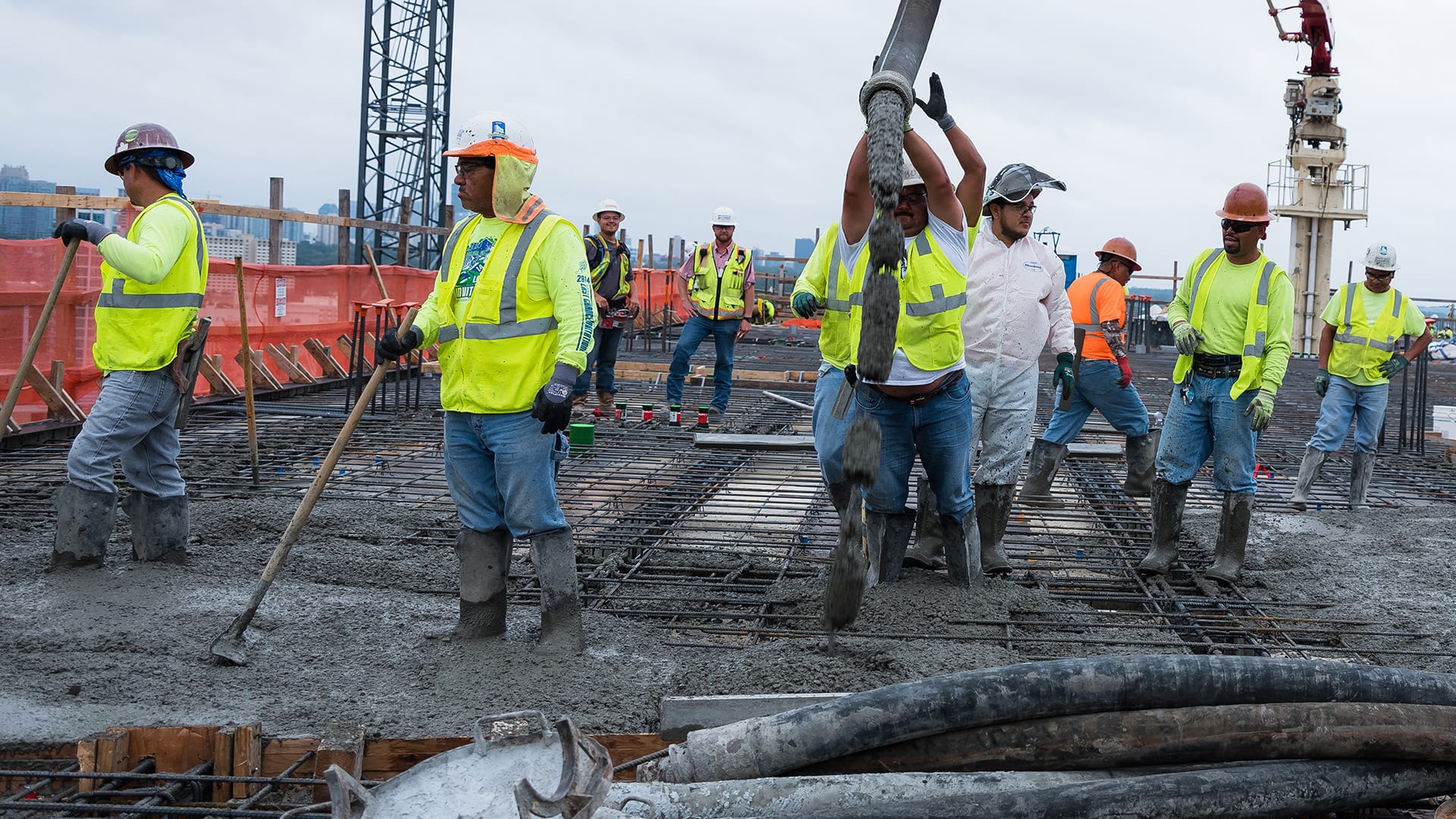
Comprehending the Vital Function of a Concrete Specialist in Modern Building and Design
Concrete contractors are necessary to the construction and layout markets. Their competence assurances that structures are not just resilient yet also aesthetically pleasing. They participate in various responsibilities, from project planning to quality assurance, and team up with designers and architects. With progressing innovations and fads, their duty is much more important than ever before. Recognizing their impact can expose understandings into contemporary construction practices and the future of structure layout.
The Relevance of Concrete in Construction
Numerous materials are used in building and construction, concrete remains a cornerstone of modern building methods due to its versatility, toughness, and strength. This composite material, made from concrete, water, and accumulations, can withstand substantial anxiety and is immune to fire, weather, and insects, making it perfect for diverse applications. Concrete's adaptability permits it to be formed into various shapes and dimensions, assisting in cutting-edge architectural styles.
In addition, its thermal mass homes contribute to energy efficiency, helping to control interior temperatures. The widespread schedule of basic materials and the reasonably inexpensive of concrete additionally boost its appeal for massive jobs, from commercial structures to facilities like bridges and roadways. As urbanization proceeds to climb, the demand for sustainable and trustworthy building products solidifies concrete's necessary duty in building, making it an essential choice for building contractors and architects intending for longevity and resilience in their jobs.
Key Responsibilities of a Concrete Professional
Concrete professionals play a vital duty in the building process, with several crucial duties that assure project success. Their tasks include job planning and style, product choice and monitoring, as well as preserving top quality control and guarantee throughout the task lifecycle. Understanding these duties is essential for valuing the professional's influence on building end results.
Job Preparation and Layout
When starting on a building and construction task, effective task preparation and design play a crucial role in a concrete contractor's duties. The professional must collaborate carefully with designers, customers, and engineers to recognize the job's specifications and goals. This involves reviewing site problems, examining layout requirements, and figuring out the scope of job. A concrete service provider is likewise in charge of developing timelines and budgets, guaranteeing that all stages of the task line up with overall purposes. Furthermore, they need to expect possible obstacles and develop services to maintain task performance. By carefully planning and developing each facet of the concrete work, the professional sets the structure for successful execution, making sure architectural honesty and adherence to safety and security criteria throughout the construction process.
Product Option and Management
Effective product choice and administration are crucial responsibilities for a concrete specialist, as these choices directly affect the high quality and resilience of the last structure. Concrete specialists need to review numerous products, consisting of aggregates, admixtures, and support types, to assure they satisfy project specifications and ecological conditions. They should consider aspects such as workability, stamina, and resistance to weathering. In addition, handling the supply chain is vital, as prompt delivery of products can remarkably influence task timelines. Contractors should preserve relationships with vendors to safeguard top quality sources while likewise keeping an eye on inventory levels to avoid extras or shortages. Inevitably, this careful choice and monitoring of products add to the overall success of building and construction jobs and the durability of the frameworks built.
Top Quality Control and Guarantee
Quality assurance and guarantee are paramount in the construction industry, especially for concrete service providers tasked with providing dependable and durable structures. Concrete professionals need to execute rigorous high quality control actions throughout the building procedure, ensuring that all products meet specified guidelines and requirements (Concrete Contractor Near Me). This includes keeping track of the mixing, pouring, and treating processes to avoid defects and enhance architectural honesty. Normal assessments are crucial, permitting professionals to recognize and fix problems immediately. Furthermore, concrete specialists commonly team up with engineers and engineers to guarantee that the last product lines up with style requirements. By adhering to strict top quality guarantee procedures, concrete professionals not just protect the durability of their work but additionally copyright the trust fund of customers and stakeholders in the construction sector
Kinds Of Projects Handled by Concrete Specialists
Although concrete service providers are frequently connected with large building and construction projects, their competence includes a varied series of applications. These experts are indispensable to residential tasks, such as outdoor patios, driveways, and foundations, assuring durability and visual charm. In industrial building, they add to the development of floors, walkways, and architectural aspects that meet details style and safety and security standards.
In addition, concrete specialists are involved in infrastructure jobs, consisting of roads, bridges, and tunnels, where their abilities ensure architectural honesty and durability. They likewise play a crucial role in ornamental concrete applications, such as stamped concrete and polished surface areas, which improve the aesthetic aspect of numerous areas. In addition, their solutions reach repair and published here maintenance work, resolving issues like breaking or erosion in existing frameworks. This adaptability emphasizes the important role concrete contractors play in both ornamental and functional elements of modern-day building and construction and style.
Qualifications and abilities Called for
Concrete service providers should have a diverse collection of skills and credentials to effectively manage the variety of jobs they undertake. Proficiency in concrete mixing, pouring, and ending up is vital, as is a solid understanding of numerous kinds of concrete, consisting of strengthened and attractive choices. Expertise of construction techniques, blueprints, and task administration concepts is critical for successful implementation.
Physical stamina and strength are important due to the requiring nature of the work. Specialists should additionally have solid analytic capabilities to attend to unexpected challenges throughout jobs. Interaction abilities are critical for collaborating with clients, engineers, and various other tradespeople.
Furthermore, getting appropriate qualifications can enhance a specialist's integrity and broaden their occupation opportunities. Constant education and learning in new techniques and materials keeps specialists competitive in a rapidly evolving market. These abilities and qualifications collectively make it possible for concrete professionals to supply top quality results efficiently and efficiently.
The Role of Concrete Contractors in Safety And Security Compliance
Guaranteeing safety conformity is an essential duty of concrete specialists, as they navigate the intricacies of building websites. These professionals are entrusted with sticking to strict safety regulations and standards, which are essential for preventing crashes and guaranteeing the well-being of all website workers. TJ Concrete Contractor. Concrete contractors have to carry out comprehensive safety and security plans that consist of training workers on proper devices usage and security methods
Furthermore, they are liable for examining products and work processes to determine potential risks. By performing normal safety audits and danger analyses, concrete professionals can proactively attend to issues before they intensify. They collaborate with other building and construction specialists, such as designers and project supervisors, to incorporate safety and security measures right into the general task strategy. Inevitably, the commitment of concrete contractors to security compliance not just protects workers but also enhances project efficiency and high quality, strengthening their crucial role in modern construction.
Fads and Innovations in Concrete Design
Recent advancements in concrete style have over at this website actually presented a variety of patterns and innovations that prioritize sustainability and aesthetic appeals. Sustainable concrete services, ornamental completing methods, and smart concrete modern technologies are improving the industry. These growths not just improve architectural stability but also add to ecologically liable construction practices.
Lasting Concrete Solutions
As the building sector increasingly prioritizes sustainability, cutting-edge concrete solutions are emerging to lower ecological impact while enhancing efficiency. One famous fad is the usage of recycled materials, such as smashed concrete and commercial by-products, which not only decreases waste however additionally boosts the concrete's homes. Developments in admixtures, including fly ash and slag, contribute to lowered carbon exhausts during manufacturing. One more substantial advancement includes the growth of permeable concrete, which enables water to stream through and decreases runoff, reducing flooding and groundwater deficiency. Furthermore, the rise of carbon capture innovations in concrete manufacturing holds guarantee for further emissions decrease. These lasting concrete services exhibit the industry's commitment to eco responsible building practices.

Attractive Ending Up Techniques
A plethora of decorative completing strategies have emerged in concrete design, changing plain surfaces into visually striking components. Strategies such as marking, staining, and brightening permit a variety of aesthetic possibilities, satisfying varied style preferences. Stamped concrete mimics natural materials like rock and block, while tarnishing presents dynamic shades that enhance the surface's allure. Refined concrete, understood for its sleek surface, includes refinement to both household and commercial areas. Furthermore, microtopping and overlay systems supply innovative options for invigorating existing concrete. These methods not only boost the visual attributes however likewise enhance durability and maintenance. As fads advance, the combination of attractive coatings remains to play a vital function in modern construction, marrying functionality with imaginative expression.

Smart Concrete Technologies
While typical concrete stays a staple in building, the emergence of wise concrete modern technologies is revolutionizing the sector by integrating advanced attributes that improve performance and sustainability. These technologies include self-healing concrete, which uses ingrained germs that activate upon fracturing, and sensor-equipped concrete that checks architectural wellness in real-time. In addition, thermochromic and piezoelectric concrete can adjust to environmental adjustments and generate electrical power, specifically. The application of environment-friendly ingredients and recycled materials additionally adds to decreasing the carbon footprint of concrete production. As these modern technologies continue to advance, they guarantee to boost durability, reduced upkeep costs, and advertise greener structure techniques, making them vital for future building jobs. The role of concrete contractors is progressively substantial in utilizing these developments.
Regularly Asked Questions
What Elements Influence Concrete Pricing in Building Tasks?
Concrete pricing in construction tasks is influenced by product prices, labor expenditures, task dimension, location, accessibility of sources, and market need. Seasonal factors and transport prices can also substantially affect the total rates framework.
Just How Do Weather Influence Concrete Work?
Weather substantially affect concrete job; extreme temperature levels, humidity, and rainfall can influence establishing times, healing processes, and total top quality - TJ Concrete Contractor. Contractors have to adjust their methods and schedules to mitigate these environmental impacts for successful task conclusion
What Is the Regular Timeline for a Concrete Project?
A typical concrete task timeline varies from a couple of days to several weeks. Aspects influencing this duration include job size, intricacy, climate condition, and healing times, which jointly figure out the overall completion schedule.
Can Concrete Contractors Aid With Layout Examinations?
Concrete contractors can indeed aid with style assessments, supplying useful insights on material choice, architectural honesty, and aesthetic options, making certain that projects meet both functional needs and the client's vision for the completed item.
What Are Common Misconceptions Concerning Concrete Resilience?
Usual misconceptions regarding concrete longevity consist of the belief that it is resistant to damage which all types are just as strong. Actually, factors like mix style, environmental problems, and upkeep considerably affect concrete's long-term efficiency.
They also play an essential duty in ornamental concrete applications, such as stamped concrete and polished surfaces, which improve the aesthetic facet of different rooms. Proficiency in concrete mixing, putting, and finishing is necessary, as is a solid understanding of different kinds of concrete, including strengthened and attractive options. One popular pattern is the use of recycled products, such as smashed concrete and industrial byproducts, which not just decreases click for source waste however also enhances the concrete's properties. While standard concrete remains a staple in building and construction, the appearance of wise concrete technologies is changing the sector by incorporating sophisticated functions that improve efficiency and sustainability. These developments consist of self-healing concrete, which uses embedded microorganisms that trigger upon splitting, and sensor-equipped concrete that keeps track of structural health in real-time.